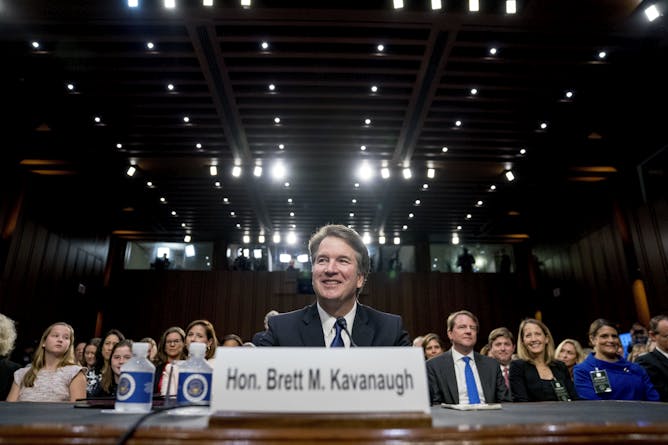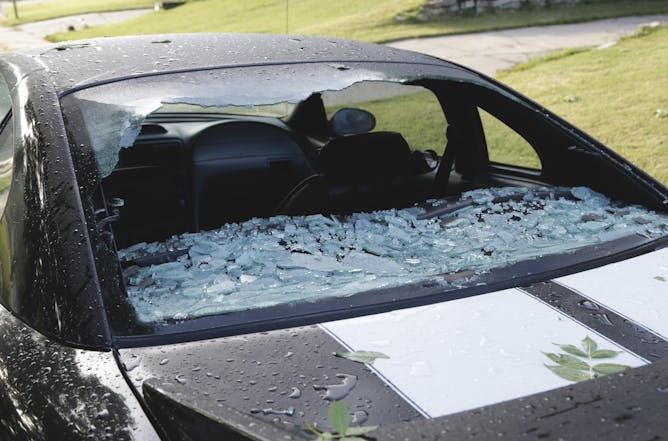Editor's note
|
|
In response to the accusation that Supreme Court nominee Brett Kavanaugh assaulted a girl as a teenager, some commentators have suggested that the misdeeds of youth shouldn’t be held against a person forever. However, Pennsylvania State University professor Eileen Ahlin points out, the criminal justice system often isn’t so forgiving – especially toward people of color. “Interactions with the criminal justice system
can impede employment opportunities, reduce access to social services such as welfare and limit housing options,” Ahlin writes.
In the midst of an opioid epidemic, surveys are still the best way to figure out how many Americans are misusing or abusing drugs. But research shows that many people fill out those surveys incorrectly. That means that the data on opioid use in the U.S. is likely full of errors.
And did you experience a crazy hail storm this summer? Colorado State grad student Samuel Childs writes that lots of Americans did. 2018 has been a record year for big hailstones – which come with big risks to people and property. He explains why more reports of baseball-sized hailstones is likely a preview of future trends in a changing climate.
|
Danielle Douez
Associate Editor, Politics + Society
|

|
|
Top stories
|

President Donald Trump’s Supreme Court nominee, Brett Kavanaugh.
AP Photo/Andrew Harnik
Eileen M. Ahlin, Pennsylvania State University
Young people of color are disproportionately affected by the lifelong consequences of having a criminal record.
|

Defining opioids.
Darwin Brandis/shutterstock.com
Joseph Palamar, New York University Langone Medical Center
Many people may misunderstand the basics about opioids. That prevents researchers from understanding the full scope of the epidemic.
|

Icy hailstones can do major damage, depending where they land.
AP Photo/Nati Harnik
Samuel Childs, Colorado State University
The future climate that scientists predict for the middle of the United States is one that will foster more hail events with bigger hailstones.
|
|
|
Education
|
-
Peter Siminski, University of Technology Sydney; Isaac Swensen, Montana State University; Jason Lindo, Texas A&M University
Reports of sexual assault increase by as much as 41 percent when the local college football team plays, according to researchers who say the increase is related to the drinking culture on campus.
|
|
|
|
Environment + Energy
|
-
Brian Joseph Gerber, Arizona State University; Melanie Gall, Arizona State University
The damage to coal ash sites from Hurricane Florence demonstrates how a community's vulnerability to natural disasters is closely linked to how stringent environmental regulations are.
-
Diego Melgar, University of Oregon; Xyoli Pérez-Campos, Universidad Nacional Autónoma de México (UNAM)
Not all earthquakes are made equal. A study on the Sept. 2017 quake that killed 300 in Mexico City found that both its location and cause were unusual.
|
|
Science + Technology
|
-
Arun Vishwanath, University at Buffalo, The State University of New York
Almost every online deception, fraud and scam – even propaganda and misinformation campaigns – begins with a fake social media profile. How do fakers get real people to agree to be friends?
-
Brian Keating, University of California San Diego
This year's Nobel Prize for literature was nixed because of a sex scandal. Other Nobels have neglected key contributors. Should all prizes be cancelled while criteria for winning is reassessed?
|
|
Trending on site
|
-
David Markowitz, University of Oregon
Researchers analyzed troves of messages sent between matches and found that the fibs people tell are usually rational ones that serve a purpose.
-
Gabriel Neal, Texas A&M University
Does it seem like everyone you know drinks apple cider vinegar, mainly in hopes of losing weight? Vinegar has a long history of high hopes attached to it. A doctor who loves vinegar explains.
-
William Moomaw, Tufts University; Gillian Davies, Tufts University; Max Finlayson, Charles Sturt University
Wetlands are some of the world's most undervalued weapons against climate change. They store huge quantities of carbon – but without better protection, many could soon be drained or paved over.
|
|
|
|
| |
| |
|
|